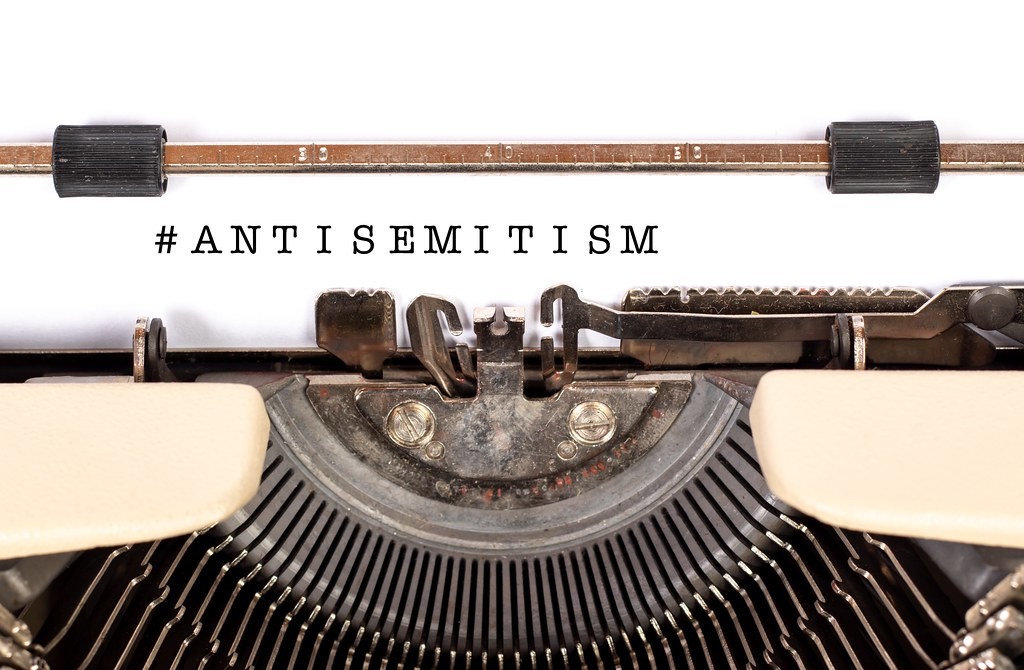Shomrei members attended a session Entitled “The Impact of White Supremacy on Antisemitism” presented by Rabbi Elliot Tepperman at Bnai Keshet on February 26. The session is part of the Interfaith “Break the Hate ” series developed by Union Baptist Church. Several of the people who attended share their recollections and thoughts about the evening:
Aileen Grossberg
On Wednesday night the fourth in the series of “Break the Hate” lecture /discussions was held at B’nai Keshet. Rabbi Tepperman spoke to an audience representing several religious institutions about anti-Semitism in generational terms.
He felt that Jews who experienced the Holocaust, either directly in Europe or indirectly as a world event, were much more likely to see anti-Semitism around them and be wary of others. He took for granted as a young person that he was safe. The same was not true of his father.
Younger Jews who grew up when Jews had taken their place as full Americans didn’t have that knee jerk reaction to casual remarks and didn’t expect incidents like the Tree of Life Synagogue shootings to happen.
What I was most moved by was Rabbi Tepperman’s repeated refrain about fear: the locked doors of synagogues are but one sign of moving from a state of safety to a state of wariness.
He raised many points about the earlier coalition between American blacks and Jews and why it may have deteriorated.
In addition, he explained that some scholars feel that today’s economic environment is ripe for the growth of anti-Semitism.
While Rabbi Tepperman spoke in great detail about anti-Semitism, he didn’t really delve much into the issue of white supremacy, the topic of the evening’s program.
The take away , however, was important: a small number of people can create a lot of fear; we need to be aware of not letting ourselves be afraid and giving in to that fear.
I do wish that there had been time for more interaction among the attendees. I thought that was a highlight of the previous session I attended.
However, this is a really important series of talks and brings people together to discuss important issues directly or indirectly affecting our entire community.
Bill Batkay
I noted with gratification the number of African-Americans present, both clergy and lay people. The program did not address the announced topic — the impact of white supremacy on Jews.
Rabbi Tepper did say that the different forms of hate — racism, homophobia, anti-Semitism, Islamophobia — are not the same and do not stem from one identical source. This was new and helpful information.
Merle Martin
The time went by very quickly. Wish we had more time for discussion, public and inter-personal.
I appreciated that the Rabbi solicited participation from attendees who weren’t Jewish.
He mentioned something I hadn’t thought about before – institutional, so to speak, memory of antisemitism experienced by Jews of previous generations (as opposed to specific instances of antisemitism experienced by ourselves, our family members, or ancestors) and passed down to us somehow, but not explicitly.
Also I hadn’t thought about the idea that many Jews experience physical and emotional anguish re antisemitism of the 19th century and earlier when discussed, even when they had never personally experienced same.
Linda Ariel
I experienced last night’s gathering as the Montclair community’s continuing desire to discuss in a meaningful way how we are currently connecting with each other. Bringing together people from different faith groups to share and to listen to each other in as authentic a manner as possible is important, even if what we hear does not reflect our own personal truths. It is only through expression that the individuals speaking and those hearing them get a better sense of each other. Otherwise, we often default to what we think that the other is thinking, based on our prior experiences, what we read, and anecdotal evidence.
I came more to listen, and I did, aiming to do so non-judgmentally. This is not so easy at times, because as Rabbi Elliot Tepperman, the rabbi of the host congregation this evening, stated, we are often triggered by other’s statements. The automaticity of the reaction is so rapid that we are often unaware that it has occurred.
I regret that I did not volunteer to offer a concern that I have pondered and have not had the comfort or forum in which to share it. Often people are treated differently because of their being different, and the way we appear is one of the first things that causes people to determine who is the other. Even though Jews have be discriminated over millennia, in subtle and in harsh, annihilating ways, in our country we have been more able to in many ways assimilate. Discrimination has often been based on appearance, skin tone, facial features, the way we dress and speak. In discussing antisemitism, I have experienced others whose appearance is clearly different, when looking at me, not understand how antisemitism could affect me, since I present as looking and behaving more like the mainstream (except for the fact that I am female). I would have liked to have generated a more open discussion about how the group may look at the Jews as white people with privilege and how they respond to our concerns about discrimination.
Click here for information about additional Break the Hate sessions
Image: “#Antisemitism (Trending Twitter Topics from 11.07.2019)” by trendingtopics is licensed under CC BY 2.0
- Passover Reflections: Seder During Wartime - Thu, Apr 18, 2024
- Parashat Tazria – 4/13/24 - Thu, Apr 18, 2024
- Parashat Shmini – 4/6/24 - Thu, Apr 11, 2024


I benefited from reading the comments of other Shomrei friends who attended this program. It confirms my impression that there is so much to learn from one another.